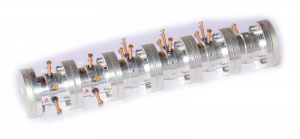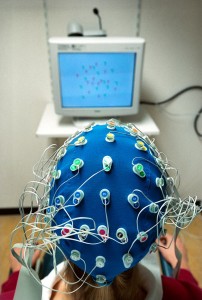Team presentation
APICS’ main endeavor is to show that certain techniques from harmonic analysis, approximation theory, and differential geometry can be made effective for identification and control of dynamical systems.
 APICS is involved with identification and design issues for linear systems in the frequency domain (i.e. 1-D deconvolution), thereby continuing former work by Miaou.Applications thereof deal mainly with the design of resonnant and surface acoustic waves filters. Meanwhile, APICS has broaden its scientific scope by considering inverse source and free-boundary problems for elliptic equations in 2-D and 3-D, with emphasis on the Laplacian and the Beltrami equation.Applications concern electro-encephalography, non-destructive control, and the localization of free-boundaries, for instance in magnetic confinement of plasmas.
APICS is involved with identification and design issues for linear systems in the frequency domain (i.e. 1-D deconvolution), thereby continuing former work by Miaou.Applications thereof deal mainly with the design of resonnant and surface acoustic waves filters. Meanwhile, APICS has broaden its scientific scope by considering inverse source and free-boundary problems for elliptic equations in 2-D and 3-D, with emphasis on the Laplacian and the Beltrami equation.Applications concern electro-encephalography, non-destructive control, and the localization of free-boundaries, for instance in magnetic confinement of plasmas.
The research of APICS in controlled dynamical systems focuses on analysing the performance of stabilizing feedback laws as compared, say to optimal control. Applications lie with trajectory design for satellites with low-thrust engines. In addition, APICS pursues a long term study of local dynamical linearizability, including the so-called flatness property.
Research themes
- Inverse potential problems. Recall that, being given an elliptic operator, a potential is generated by the convolution product between one of its fundamental solution and a measure. The related inverse problem then consists in recovering the measure from the knowledge of its potential. It appears naturally in geophysical or electricomagnetical issues, and more generally in non-destructive control, whivh is one of APICS’s main applications field.
- Frequency design and synthesis. The key remark here is that the transfer function of a stable causal linear system can be looked upon as a functional object with some analyticity properties. Part of the work consists in proposing a reconstruction process of the transfer function, starting with a set of pointwise measurements. A two step process has been set up; the transfer function is first sought as a function in a Hardy space (bounded extremal problem), then approximated as a rational function (possibly matrix-valued) of given McMillan degree. This has been implemented in softwares like Rarl2 and Presto-HF, that are of use nowadays at the production level to Alcatel-Alenia-Space. Apics is also engaged in the design and tuning of Surface Acoustic Wave filters..
- Nonlinear feedback control. The objective is to study CLFs (Control Lyapunov Functions), quantify feedback law’s performances. Application concern the design of control laws for low thrust satellite orbital transfer. APICS is also interested in dynamic system equivalence, linearization, classification of nonlinear models, differential flatness.
International and industrial relations
- CNES Toulouse (Microwave filters),
- Alcatel-Alenia-Space Toulouse (Microwave filters)
- Alcatel-Alenia-Space Cannes (orbital satellite control)
- Thales Airborne Systems (filtres micro-ondes)
- Temex (filtres SAW)
- NATO CLG (Collaborative Linkage Grant),
- Member of the NSF EMSW21 Research Training Group
- Marie Curie Multi-partner Training Site
Keywords: Identification Control Design Harmonic analysis Inverse elliptic problems Deconvolution Software
Activity report and Presentations
- Activity report 2010
- Transparents Présentation APICS au bureau du CP le 9 Janvier 2004 ,
- Transparents Présentation APICS au CP le 19 Janvier 2004 ,
- Transparents Présentation APICS au CP le 11 mai 2004 (idem en Prosper) ,
- Document du projet APICS, Version 1er decembre 2003 ,
- Short English version of the APICS document (revised version 1.48)


